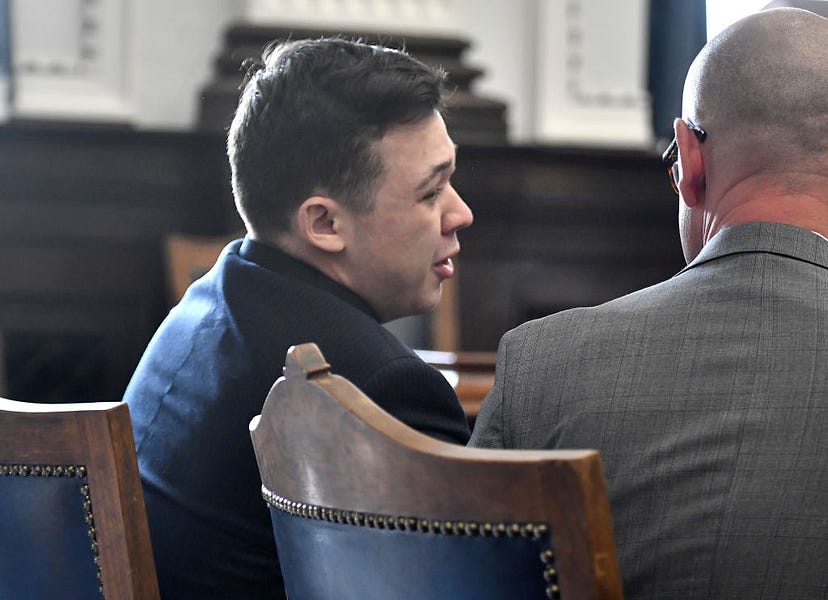Happy Sunday! It was a busy news week: President Joe Biden and Xi Jinping held a virtual summit, Russia made a big mess in space, a federal grand jury indicted Steve Bannon, the House passed the Build Back Better Act, and a Wisconsin jury acquitted Kyle Rittenhouse of all charges in his trial for killing two men and injuring another during riots in Kenosha last summer.
The verdict in the Rittenhouse trial came down early Friday afternoon. The jury had deliberated for more than 25 hours over the course of four days. Alas, it took about 30 seconds for the reaction to the verdict to get really stupid. Missouri Rep. Cori Bush tweeted that the decision was “white supremacy in action.” And New York Rep. Sean Patrick Maloney put out a statement protesting that Rittenhouse was able to bring a gun to “a protest against the unjust killing of Jacob Blake, an unarmed Black man.” Outgoing New York City Mayor Bill de Blasio’s statement bemoaned that “a violent, dangerous man chose to take a gun across state lines and start shooting people.”
It wasn’t much better from the other side. In response to Bush’s tweet, several people responded with a meme claiming that a black high school student served one day in jail and was “never mentioned again” after shooting a classmate and a teacher. Some chose to celebrate Rittenhouse as “king.”
I’m not here to weigh in on the case itself. For that, you can read David’s French Press from Tuesday, or his newsletter over at The Atlantic. I’d rather reflect on what the reaction says about the state of things. Facts matter, and there weren’t enough of those on display. First, Maloney’s statement: Jacob Blake, whose shooting by police kicked off the protests and riots, was not killed. And he wasn’t unarmed: He had a knife. Maloney is the chairman of the Democratic Congressional Campaign Committee, and the DCCC issued an apology and a corrected statement, but the original is still out there spreading on social media. De Blasio was incorrect to say that Rittenhouse took “a gun across state lines.” People who read the statements from Bush or the ACLU without knowing the full details of the case might well assume that Rittenhouse’s victims were black. They weren’t.
But the claims attempting to draw a parallel between Rittenhouse and Timothy Simpkins, who shot two people at his high school, are flat-out inaccurate. The shooting just happened in October, and he’s been charged with three counts of assault with a deadly weapon. There are numerous articles about his case, so it’s unfair to say that he was “never mentioned again.” And nothing is gained by describing a teenager who unnecessarily put himself into a dangerous situation as a “king” or “hero.”
Now, some of these statements are simply falsehoods and others just reflect extreme views. But lies and extremism are dangerous bedfellows. It doesn’t matter whether publications and social media outlets seek to combat misinformation (Disclosure: The Dispatch is part of Facebook’s third-party fact checking program) if the rewards for raising the temperature seem greater than the costs. Those rewards might seem nebulous to most of us: —More followers? “Owning” the other side? A smug feeling of moral superiority?—but it’s clear that people feel like they are getting something out of it. And while politicians and pundits might not face consequences for being misleading or exacerbating our differences, the cost for society is high.
One thing that is clear is that there are no easy fixes. As you’ve heard more than a few times from us by now, one reason we started The Dispatch was to be part of the solution: rely on facts, dig for the truth, and keep the temperature down. But there are times it feels like an uphill battle. We’re glad you’re here for us, supporting our work. Thanks as always for reading.
Divorce is down. Teenage pregnancy and out-of-wedlock births are down. Abortion is likely at its lowest rate since before Roe v. Wade. Shouldn’t we be cheering? Only if we ignore the fact that divorce is down because fewer people are getting married and that pregnancies and abortion are down because people are having less sex. Technology enables people to live more solitary existences while meeting their basic needs, leaving them isolated and not making connections that lead to friendships, marriage, and starting a family. What we have here is a failure to launch. In an important essay, Yuval Levin argues that we’ve replaced one kind of dysfunction with another, and that social breakdown remains a problem—this time with different symptoms and causes. “Habits and institutions of restraint can work like sculptors of the social order—selectively chipping away at our wild, boisterous pursuit of happiness to shape it into more beautiful forms of energetic human action,” he writes. “But what if we fail to act on our longings to begin with? What if there is nothing to restrain, and so no raw material for the sculptor to work with?”
Continuing on the theme of “things might seem better until you look closely,” Paul D. Miller offers a critique of the modern university and the downsides of academia’s abandonment of the classics. He notes that less than 5 percent of the U.S. population had bachelor’s degrees in 1940, but today the number is 37.5 percent. But there’s a problem: “To get a college degree 100 years ago, students had to master Latin, Western history, rhetoric, English literature, higher mathematics, and a smattering of theology and philosophy. … Student activists revolted against the classics in the 1960s, believing them to be irrelevant and racist. They demanded fundamental changes to make college curricula more relevant and representative—and they won. While broadening the canon held promise, reforms generally subtracted more than they added and threw the entire idea of a canon into question. Today students get, at most, a mere sampling of a classical liberal arts education.” Today, college is more about vocational training, but students graduate thinking they’ve been given a liberal arts education. “It turns out none of us are terribly well-educated, and we are all more confident than our actual competence merits,” he concludes.
Jonah says right up front he didn’t want to write about this particular topic, but it’s important. So I’ll share it for the same reason. A certain segment of the right has decided that populist nationalism is the way forward for a conservative movement that has long rallied around small government, free markets, and liberty. But adherents can’t offer a good definition of “national conservatism,” preferring merely to insist it’s necessary to combat a leftism that is more radical and dangerous than previous eras. Jonah is not persuaded. “Maybe the left is worse than ever in some ways, but I think in other ways it’s almost certainly not,” he writes. “Things are complicated. But what is obvious to me is that the threat to the country is not lessened when conservatives think the answer to that threat is to emulate progressive tactics and categories of thought.”
If you pay attention to bylines around here, you know that Haley Byrd Wilt does a great job covering Congress for us. Turns out, she’s also a bit of a space expert. When news broke over the weekend that Russia had blasted a defunct satellite to smithereens in a test, we were lucky to benefit from her study of space debris. She provides important background information about what scientists have learned over the years, details how many pieces of debris are floating around up there, and how scientists are working on solutions. “Experts fear that crashes and close calls like this are going to become more common due to massive growth in the number of operational satellites in orbit today, and tens of thousands of new satellites set to be launched in the coming years,” she writes.
And the best of the rest:
-
A bipartisan group of lawmakers recently introduced the Filter Bubble Transparency Act. If you think the name sounds silly, wait till you get a load of the text. The legislation would require big social media companies to offer a version of their services that doesn’t employ “opaque algorithms.” Klon Kitchen has a better idea: If you don’t like a social media platform … don’t use it.
-
Before the Kyle Rittenhouse verdict came down, David wrote about the case for French Press. He made a series of very sensible points: Rittenhouse was foolish to put himself in that position, yet that does not diminish his right to self defense. But also … “it’s a mistake to believe that open carry is always tied to out-of-control unrest.”
-
Now that the dust has settled on the 2021 elections, it’s already time to think about 2022. In The Sweep, Sarah checks in on Senate races in Alaska and Texas, Audrey writes about the chances of Larry Hogan running for Senate in Maryland, and Chris Stirewalt argues that the Democrats are going to face a drubbing if they can’t figure out how to get out of their pandemic mindset.
-
There have been increasingly loud calls for countries to boycott the Beijing Olympics, scheduled to start in February, over China’s actions against, well, take your pick—Hong Kong, the Uyghurs, Taiwan. And that was before Chinese tennis star Peng Shuai went missing after accusing a Chinese Communist Party official of sexual assault. The Morning Dispatch reports on this disturbing story and asks whether it will make any difference regarding the Olympics.
-
Speaking of China, Danielle Pletka writes about how the CCP uses shell companies and other methods to acquire sensitive technology from Western nations without anyone knowing who’s really buying it or what they are doing with it.
-
On Advisory Opinions, David and Sarah try to get to the bottom of the Yale Law School controversy. On The Dispatch Podcast, the gang talks about inflation, pandemic fatigue, and Kamala Harris. And on The Remnant, Jonah welcomes fan favorite Will Saletan.







Please note that we at The Dispatch hold ourselves, our work, and our commenters to a higher standard than other places on the internet. We welcome comments that foster genuine debate or discussion—including comments critical of us or our work—but responses that include ad hominem attacks on fellow Dispatch members or are intended to stoke fear and anger may be moderated.
With your membership, you only have the ability to comment on The Morning Dispatch articles. Consider upgrading to join the conversation everywhere.